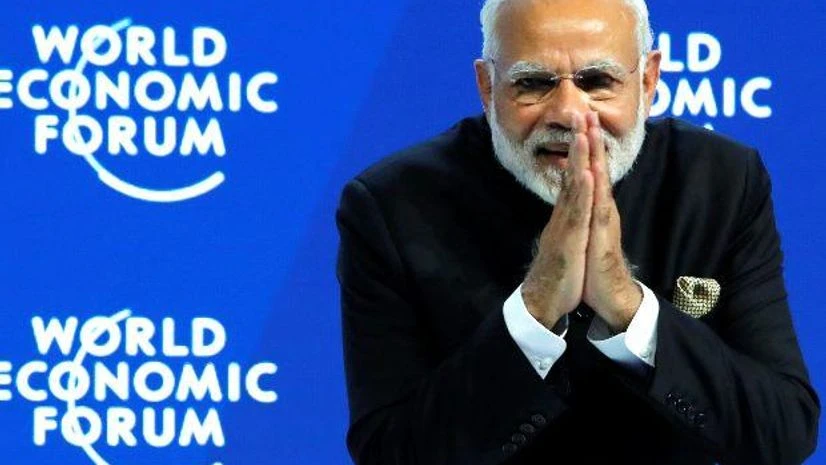Prime Minister Narendra Modi mounted a defence of globalisation at the World Economic Forum on Tuesday, urging joint action on climate change and economic cooperation, in a speech some delegates took as a swipe at US President Donald Trump's America First agenda.
Modi, making the forum's first speech by an Indian head of government in more than two decades, did not mention Trump by name but he criticised the rise of protectionism in remarks delivered three days before the US President addresses the summit.
“Instead of globalisation, the power of protectionism is putting its head up,” Modi said, speaking in Hindi. “Their wish is not only to save themselves from globalisation, but to change the natural flow of globalisation.”
Speaking at the plenary of the WEF annual summit, the PM also said climate change and terrorism were grave concerns before the world. While terrorism was dangerous, he said, equally dangerous was the “artificial distinction” made between a “good terrorist” and a “bad terrorist”. He said it was painful to see some youngsters getting radicalised.
Modi is leading a big government and business delegation to the summit in the Swiss ski resort of Davos, aiming to showcase India as a fast-growing economic power and a potential driver of global growth. His opening address was a moment of personal triumph for the leader and the occasion also recognised India's growth as an economic and geopolitical power.
Modi's speech echoed some of the points made by Chinese President Xi Jinping at last year's Davos summit, but he failed to generate the same enthusiasm. A year ago, Xi, speaking days before Trump was inaugurated, staked out China's position as the world's economic powerhouse, promising a greater openness to globalisation.
More From This Section
However, Xi, who is not attending this year, is not seen to have delivered on the broad promises made at Davos over the past year, but his speech was seen as a key moment in China's attempt to fill a void created by a more inward-looking United States.
In his speech, Modi laid out three big challenges facing the world: climate change, terrorism and growing protectionism.
“The result of this is that we are seeing new types of tariff and non-tariff-based barriers being imposed. Bilateral and multilateral trade negotiations appear to have come to a halt,” he said.
He said the world must come together to solve these issues and India could show it the way, referring frequently to ancient Indian thought and scriptures that call for harmony between humans and nature and refer to the world as family.
Modi said climate change was a major threat to the world, yet the world had failed to come together to tackle it. He said everyone wanted carbon emissions to be cut, but the rich world was not ready to help developing economies with new technology.
India, one of the world's fastest-growing major economies and a growing contributor to pollution, has said it is keen to honour its commitment to clean up the environment despite Trump pulling out of the Paris accord on cutting carbon emissions.
Modi also highlighted reforms and policies his administration had undertaken to make India more open. He said his government had abolished some 1,400 archaic laws. “We are removing red tape and laying the red carpet,” Modi said, adding “Come to India If you want wellness along with wealth, wholeness along with health and peace with prosperity.”
The PM said India was poised to become a $5-trillion economy by 2025, recalling that the last time an Indian Prime Minister attended the WEF was 21 years ago. He said, “India's GDP in 1997, when the last PM came to Davos, was a little over $400 billion. It has grown six times since.”
He quoted poet Rabindranath Tagore, saying he had written of "a haven of freedom where the world is not divided by narrow walls" and called for turning that into reality, stating that "India will always be a unifying and harmonising force."
Some business leaders said India still had a lot of work to do to attract more investment, including taming bureaucracy, tackling corruption and cleaning up pollution.
Arun Kumar, chairman and CEO of accounting firm KPMG in India, said: “He laid out where India stands in terms of his preference for a multi-polar and multicultural world."
Under his America First agenda, Trump has threatened to withdraw from the North American free-trade agreement, disavowed the global climate change accord and criticised global institutions including the United Nations and NATO.
Anindya Bakrie, chief executive of media company PT Bakrie Global Ventura, part of Indonesia's Bakrie conglomerate, said Modi's remarks were a welcome contrast to US isolationism.


Prime Minister Narendra Modi during the opening plenary of the World Economic Forum annual meeting in Davos on Tuesday. Photo: Reuters

)
